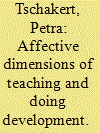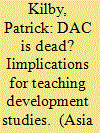|
|
|
Sort Order |
|
|
|
Items / Page
|
|
|
|
|
|
|
| Srl | Item |
| 1 |
ID:
160827


|
|
|
|
|
| Summary/Abstract |
Like the development industry, development pedagogy and practice have begun to take into account the role of emotions and the deeper, affective and embodied experiences of understanding and doing development. In her ground‐breaking piece ‘Emotional geographies of development’, Sarah Wright illustrates how emotions not only create development subjects and associated subjectivities, but also provide a powerful entry point for resistance that may ultimately lead to transformative social change. Post‐colonial and feminist scholars have long emphasised the role of emotions such as anger, fear, shame, joy and hope in discursive construction of the ‘Other’ and the persistence of false binaries that obscure layers of struggle, exclusion and disenfranchisement. In this paper, we (students and educators) reflect on the role of emotions and affective engagements with development, drawing upon classroom discussions as well as reading and reflection logs of those studying for a Master in International Development (MID) at the University of Western Australia. We explore how explicit efforts to be attentive to our own emotions while digesting and deliberating material for this unit allow us to better grasp our own positionality while revisiting our personal entanglements with the ‘Other’ – the quintessential development subject. Making space for ‘more‐than‐rational’ aspects of development enables scholars and educators to experiment with affective options for interdisciplinary teaching in a distinctly more personal way than students may expect from a postgraduate degree in international development.
|
|
|
|
|
|
|
|
|
|
|
|
|
|
|
|
| 2 |
ID:
160832


|
|
|
|
|
| Summary/Abstract |
In the context of rapidly evolving development landscapes, the practice of development management has become increasingly complex. Trends, such as a decline in the overall volume of official development assistance, growing domestic inequality and the localisation agenda, are seeing a shift in the way aid is delivered and managed. This is requiring development managers from the Global North to be much more aware of their own values and world view and to be highly skilled in areas such as relationship management, communication, facilitation, ethics and advocacy alongside more traditional competencies such as monitoring and evaluation. Massey University's own research with the New Zealand global development sector supports this view and we have adapted our core development management course accordingly. Through pedagogy that is value‐based, ethically informed and practice‐orientated, we are working to equip our graduates to adapt to the complexities of development management. This includes prioritising ethics and relationship management and being aware of our responsibilities to Tangata Whenua as a Treaty‐led university. Our universities are well placed to offer the kind of innovative development studies education that will put our graduates and the communities that they serve on a pathway to better development outcomes in the 2020s.
|
|
|
|
|
|
|
|
|
|
|
|
|
|
|
|
| 3 |
ID:
160830


|
|
|
|
|
| Summary/Abstract |
This paper argues that the Western paradigm of foreign aid promoted by the Development Assistance Committee is rapidly losing relevance in development studies and its related academic teaching programmes. The longstanding Southern‐led approaches to aid and development are now coming to the fore. China's Five Principles of Peaceful Coexistence (finalised at Bandung in 1955) and the Eight Principles for Economic Aid and Technical Assistance to Other Countries (1964) are increasingly emphasised as points of difference to Western aid. It is the rise of the South that has challenged the dominant development paradigm(s) over the past 50 years. The discipline of development studies has been slow to address these challenges in how it trains future development practitioners. I will argue that development studies programmes in Australian universities have a focus on Western foreign aid: either questioning its hegemonic nature as a tool for neo‐liberal or neo‐colonial development on the one hand; or questioning aid effectiveness and how well it addresses contemporary challenges. This paper explores the challenges in examining South–South cooperation and a different development paradigm in producing relevant development studies curricula and pedagogies.
|
|
|
|
|
|
|
|
|
|
|
|
|
|
|
|
| 4 |
ID:
160825


|
|
|
|
|
| Summary/Abstract |
Southeast Asia is a development success story. By 2025, it is forecast that extreme poverty in the region will have been ‘eradicated’. Does this mean that the challenges so evident in the 1960s when the countries of the region began to pursue development have been met, and the objectives achieved? The paper makes a case for thinking afresh about development and the poverty project, recognising that development is never neatly achieved but, rather, re‐worked, re‐engineered and re‐imagined over time. This is done through identifying different categories of ‘poor’, each produced through different poverty‐making processes, measured and viewed in different ways, and their poverty addressed using different approaches and policies. With specific reference to the cases of Laos and Thailand, and drawing on longitudinal research in the latter country, it is argued that while economic growth does trickle down, it trickles down in quite discrete and often contingent ways. Furthermore, there is always development work to be done, because development creates its own work.
|
|
|
|
|
|
|
|
|
|
|
|
|
|
|
|
| 5 |
ID:
160828


|
|
|
|
|
| Summary/Abstract |
Increasing numbers of Australian students are travelling overseas to undertake short‐term work‐integrated learning placements with community development organisations. In light of recent criticisms emerging in academic and public commentary on short‐term international volunteering, this paper highlights the need for a support curriculum that caters for students from diverse discipline backgrounds, often with little or no previous understanding of community development principles or intercultural engagement. In doing so, we question who is best placed to develop an appropriate curriculum and what might it look like. We draw on Macquarie University's Professional and Community Engagement community development programme to critically reflect on the importance of engaging with diverse knowledge frameworks, approaches to learning and subject expertise of our international community partners. In particular, this paper showcases a community‐based development module co‐created with community partners that aims to encourage students to rethink western‐dominated understandings of development, poverty and inequality. To conclude, we explore how co‐creating curriculum with community partners unsettles assumptions of the university as the only site of expert knowledge and knowledge‐making practices, and reflect on the challenges encountered as we try to contribute to the development of socially and environmentally conscious students.
|
|
|
|
|
|
|
|
|
|
|
|
|
|
|
|
| 6 |
ID:
160826


|
|
|
|
|
| Summary/Abstract |
A more polycentric global development landscape has emerged over the past decade or so, rupturing the formerly dominant North–South axis of power and knowledge. This can be traced through more diversified development norms, institutions, imaginaries and actors. This paper looks at one trend within this turbulent field: namely, the ways in which ‘Northern’ donors appear to be increasingly adopting some of the narratives and practices associated with ‘Southern’ development partners. This direction of travel stands in sharp contrast to expectations in the early new millennium that the (so‐called) ‘traditional’ donors would ‘socialise’ the ‘rising powers’ to become ‘responsible donors’. After outlining important caveats about using such cardinal terms, the paper explores three aspects of this ‘North’ to ‘South’ movement. These are (i) the stronger and more explicit claim to ‘win‐win’ development ethics and outcomes; (ii) the (re)turn from ‘poverty reduction’ to ‘economic growth’ as the central analytic of development; and (iii) related to both, the explicit and deepening blurring and blending of development finances and agendas with trade and investment.
|
|
|
|
|
|
|
|
|
|
|
|
|
|
|
|
| 7 |
ID:
160824


|
|
|
|
|
| Summary/Abstract |
The challenge of development is becoming increasingly difficult to address. At a time when the Agenda 2030 Sustainable Development Goals and the 2020 Paris climate accord call for long‐term strategic planning to address our most pressing social and environmental crises, we are confronted by enduring and deepening forms of socioeconomic inequality, climate change denial, persistent conflict, mass displacement and widening democratic deficit. New forms of poverty are emerging through the very processes that have brought prosperity; at the same time, the reconfiguration of the global development landscape through enhanced South−South cooperation (SSC) presents both opportunities and obstacles for poverty alleviation.
|
|
|
|
|
|
|
|
|
|
|
|
|
|
|
|
| 8 |
ID:
160829


|
|
|
|
|
| Summary/Abstract |
Despite offerings at most universities, development studies in Australia does not have a professional body nor an academic association to prescribe core skills and standards, or to facilitate discussions about curriculum requirements and core competencies of graduates. This article analyses postgraduate coursework programmes focused on international and/or community development at 10 universities in Australia. It examines the faculty or school in which the programme is located, the core competencies the programmes aim to instil in graduates and how each programme is framed. In particular, it examines which skills have been defined as core requirements in line with the new Australian Qualifications Framework. The research found that, across Australia, development studies alternatively focuses students on critical thinking and understanding the history of ‘development’ or on teaching the practical skills (such as project and finance management) needed as development workers. We argue that the discipline needs to think more about core competencies and engage more actively in attempts to decolonise development studies teaching.
|
|
|
|
|
|
|
|
|
|
|
|
|
|
|
|
|
|
|
|
|